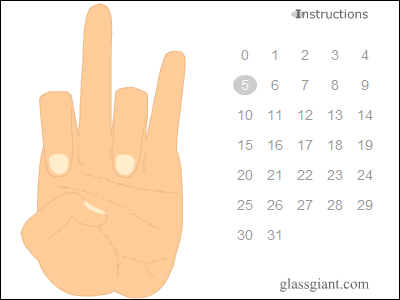Why is 'only humans able to handle mathematics' unlike crows and bees?

Previous studies have shown that the concept of numbers
Why animals recognize numbers but only humans can do maths
https://theconversation.com/why-animals-recognise-numbers-but-only-humans-can-do-maths-165121
The concept of numbers is not limited to humans, but can be found in other higher organisms. According to Goebel, a system that can recognize numbers of 3 or more depends on the working memory of the individual, and as the brain grows as an adult, large numbers can be estimated at a rough level without counting. It will be like that. For example, when there are 'a tree with about 400 nuts' and 'a tree with about 500 nuts', even if you don't count the nuts accurately, a tree with 500 nuts is more advantageous. Can be judged.
Higher organisms have evolved to make decisions in favor of survival strategies, using the concept of numbers specifically to approximate large numbers, Goebel said. For example, the Mundurk, an indigenous people of the Amazon, do not have the exact numbers, but they do have a lot of words that approximate the quantity of things, such as 'little' and 'many.' This is because it does not make sense for the Mundurk tribe to grasp the numbers in detail, and it makes more sense to express a wide variety of approximations of large numbers.

Then, if we can grasp only a large number of higher organisms including humans, that is not the case. According to Mr. Goebel, human babies can already grasp the number from about 10 months after birth, but it is said that the range of the number that can be grasped is about 3. For example, if you remove one of three apples, you can recognize that the number of apples has decreased, but if there are more apples, you cannot detect the change in the number. This seems to be the same for animals with small brain capacity such as fish and bees.
In other words, higher organisms, including humans, have two types: 'the ability to approximate and compare large numbers with reasonable accuracy' and 'the ability to recognize very small numbers with high accuracy'.
However, humans differ from other animals in that they can symbolize numbers. It is not clear when humans began to count, but it seems that Neanderthals 60,000 years ago counted with marks on animal bones. When numbers are represented by symbols, numbers of 3 or more can be counted with extremely high accuracy.
Externalizing the process of counting is possible, in addition to symbolization, by generally counting with the ten fingers of both hands. The Yupno tribe of Papua New Guinea can be counted up to 33 using various parts of the body such as toes, ears, eyes, nose, nostrils, nipples, navel, scrotum, and penis.

As we began to work with larger numbers, we could no longer count numbers by body parts alone, and as a result we began to use advanced number systems that symbolized numbers. In modern times, most humans use Arabic numerals from 0 to 9 to represent infinite numbers in decimal. The symbolization of numbers is an amazing invention for humankind, Goebel said.
Children who have a vague concept of numbers will be able to handle and predict numbers with higher accuracy by memorizing numbers. Just as the word 'nijugo' is replaced by the number '25', the language plays a central role in the concept of numbers, and people can handle mathematics. .. 'Animal and humans routinely get numerical information from the environment, but it is the language that ultimately makes humans stand out and enables mathematics. We just choose fruitful bushes. Instead, we can do the calculations that underlie civilization. '

Related Posts:
in Science, Posted by log1i_yk







